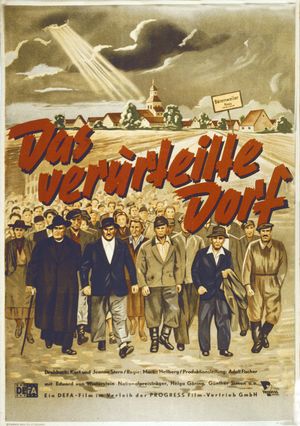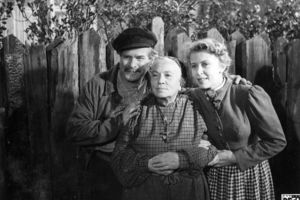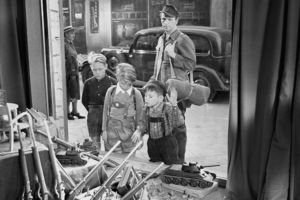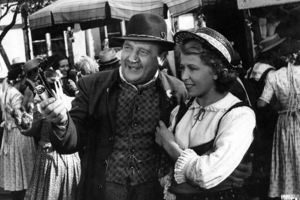Das verurteilte Dorf
Director: Martin Hellberg, 106 Min., Black-White, Feature Film
Deutsche Demokratische Republik (DDR)
DEFA-Studio für Spielfilme, 1951
- Film/Video Format
- 35 mm
- Length in m
- 2924
- Other Title
- Gegen Remilitarisierung in Westdeutschland
- English Title
- The Condemned Village
- Premiere Date
- Release Date (for Cinema)

(Dir.: Martin Hellberg, 1951)
Short Summary (English)
Heinz Weimann returns to his Bavarian village of Bärweiler after spending long years in captivity as a prisoner of war. Glad to be able to continue his life as a farmer in peace, he even accepts that Käthe, the love of his youth, has married in the meantime. But the American authorities want to vacate the village to build a military air base. The village’s residents are outraged and try everything to prevent the destruction of the village. But neither the bishop nor the state government consider their protests. When the whole village demonstrates peacefully in front of the government building, the authorities use bludgeons and water cannons to fend them off. The villagers are determined to continue their protest, only Käthe’s husband Fritz follows the instructions and leaves the village without his wife. Heinz on the other hand tries to encourage his fellow residents and is even arrested for his resistance against the authority of the state. But finally, the workers and farmers accomplish a turn of events with the help of the surrounding villages. A strike forces the American military police, that has already arrived to vacate the village, to withdraw.
(Quelle: filmportal)

(Dir.: Martin Hellberg, 1951) Photography: Eduard Neufeld

(Dir.: Martin Hellberg, 1951) Photography: Eduard Neufeld
Film Crew
- Director
-
- Martin Hellberg
- Script
-
- Jeanne Stern
- Kurt Stern
- Camera
-
- Karl Plintzner
- Joachim Hasler
- Film Editing
-
- Johanna Rosinski
- Cast
-
- Helga Göring (Käthe Vollmer)
- Günther Simon (Heinz Weimann)
- Eduard von Winterstein (Dorfpfarrer)
- Albert Garbe (Bürgermeister)
- Marga Legal (Witwe Rühling)
- Albert Doerner (Fritz Vollmer)
- Lotte Crusius (Mutter Weimann)
- Otto Eduard Stübler (Bauer Meisel)
- Friedrich Gnaß (Bauer Scheffler)
- Ulrich von der Trenck (Dorfschullehrer)
- Aribert Grimmer (Bauer Riebnitz)
- Wolf Kaiser (Amerikanischer Oberst)
- Helmuth Hinzelmann (Innenminister)
- Paul Paulsen (Bischof)
- Heinz Dhein (Klaus Meitner)
- Hermann Stövesand (Anton Reinhard)
- William (auch: Willi; Willy) Gade (Landbriefträger)
- Werner Pledath (1. Direktor)
- Josef Peter (auch: J. P.) Dornseif (2. Direktor)
- Albert Venohr (Amerikanischer Captain)
- Heinz Rosenthal (Regierungsrat)
- Hans Finohr (Amerikanischer General)
- Karl-Heinz Deickert (Peter Albrecht)
- Nico Turoff (Bauer)
- Georg Kröning (Bauer)
- Paul Pfingst (Arbeiter)
- Helmuth Bautzmann (Arbeiter)
- Hermann Stetza (Zimmermann)
- Alfred Stein (Schankwirt)
- Hugo Kalthoff (Sekretär des Bischofs)
- Gustav Adolf Keune (Gerichtsvorsitzender)
- Otto Dierichs (Staatsanwalt)
- Hans Rose (Gefängniswärter)
- Egon Vogel (Bauer)
- Liesel Eckhardt (Bäuerin)
- Ruth Baldor (Lind-Bäuerin)
- Maria Köhler (Bäuerin)
- Oskar Höcker (Lind-Bauer)
- Frank Michelis (Bauer)
- Herbert Bendey (Polizeioffizier)
- Willi Narloch (Polizeioffizier)
- Edgar Engelmann (Bauernbursche)
- Marianne Fahl (Ami-Braut)
- Dieter Perlwitz (Bauernbursche)
- Barbara Adolph (Anna)
- Carla Hoffmann (Bäuerin)
- Odette Orsy (Schankwirtin)
- Harro Tenbrook (Verteidiger)
- Hannes Cujath (Amerikanischer Militärpolizist)
- Willi Wietfeldt (Bauer)
- Alois Krüger (Polizist)
- Harry Riebauer (Amerikanischer Militärpolizist)
- Toni Meitzen (Minister)
- Hansjoachim Büttner (Minister)
- Friedrich Teitge (Geistlicher)
- Ludwig Sachs (Telegrammbote)
- Paul R. Henker (Geschäftsmann)
- Otto Sommer (Geschäftsmann)
- Fritz Bogdon (Gepäckträger)
- Viola Recklies (Bäuerin)
- Thea Elster (Bäuerin)
- Gisela Icke (Bäuerin)
- Siegfried Lewinski (Bauer)
- Herbert Rüdiger (Bauer)
- Lutz Götz (Bauer)
- Reimar Johannes Baur (Bauernbursche)
- Egon Hasche (Bauer)
- Leo Sloma (Bauer)
- Karl Brenk (Amerikanischer Militärpolizist)
- Bob Bolander (Amerikanischer Beamter)
- Karl-Wilhelm Streit (Bürgermeister von Wesselburg)
- Lili Albert (Rednerin)
- Jean Brahn (Schaubudenbesitzer)
- Maria Kühne (Sekretärin)
- Maria Grünfeld (Reinemachefrau)
- Karl Block (Hamburger Hafenarbeiter)
- Paul Streckfuß (Kasseler Arbeiter)
- Hannes Ponsel (Ruhrkumpel)
- Richard Klaer (Arbeiter)
- Paul Knopf (Arbeiter)
- Teddy Wulff (Arbeiter)
- Arno Pollo (Arbeiter)
- Hubert Piel (Arbeiter)
- Kurt Barthel (Arbeiter)
- Fritz Leonhard (Polizist)
- Horst Zimmermann (Polizist)
- Wilhelm Burmeier (Polizist)
- Günther Glaser (Polizist)
- Hans Schwenke (Polizist)
- Erwin Mosblech (Polizist)
- Friedrich Löffler (Polizist)
- Carl Mau (Polizist)
- Assistant Director
-
- Günter Reisch
- Production Design
-
- Wilhelm Vorwerg
- Alfred Schulz
- Script Editing
-
- Martha Fürmann
- Music
-
- Ernst Roters
- Sound
-
- Albert Kuhnle
- Costume Design
-
- Vera Mügge
- Make-Up
-
- Marian Babiuch
- Hanns (auch: Hans) Wosnik (auch: Wosnick)
- Willy Stuhr
- Vera Liebing
- Production Management
-
- Adolf Fischer
- Unit Production Management
-
- Horst Lockau
- Heinz Walter
- DEFA Photography
-
- Eduard Neufeld
Awards
- VIII. Internationales Filmfestival Karlovy Vary (1952): Friedenspreis
- Nationalpreis I. Klasse (1952): Autor - Kurt Stern
- Nationalpreis I. Klasse (1952): Schauspieler - Eduard von Winterstein
- Nationalpreis I. Klasse (1952): Regisseur - Martin Hellberg
- Nationalpreis I. Klasse (1952): Kameramann - Karl Plintzner
- Nationalpreis I. Klasse (1952): Autorin - Jeanne Stern
- Nationalpreis I. Klasse (1952): Schauspieler - Albert Garbe
- Weltfriedenspreis (1953): die Autorin - Jeanne Stern
- Weltfriedenspreis (1953): der Autor - Kurt Stern
- Weltfriedenspreis (1953): der Regisseur - Martin Hellberg
Short Summary (German)
Nach langer Kriegsgefangenschaft kommt Heinz Weimann heim in sein Dorf Bärenweiler in Westdeutschland. Er ist glücklich, wieder den Acker bestellen zu können. Da erreicht ihn die Nachricht, dass das Dorf einem amerikanischen Militärflugplatz weichen muss. Die Bauern sind empört, protestieren bei der Landesregierung - vergebens. Der Fall wird publik, und sie erhalten Unterstützung aus dem ganzen Land. Auch das hat keinen Erfolg. Die Militärpolizei rückt zur Räumung an. Da läuten die Glocken der Kirche Sturm, und Menschen aus den Nachbardörfern eilen zu Hilfe. Bärenweiler wird gerettet.
(Quelle: Das zweite Leben der Filmstadt Babelsberg. DEFA-Spielfilme 1946-1992)
Short Summary (Other Languages)
Dopo una lunga prigionia, Heinz Weimann rientra a Bärenweiler, una paesino nella Germania occidentale, felice di poter tornare a coltivare il suo campo. La notizia che il villaggio verrà abbattuto per fare posto a un campo d'aviazione militare lo sconvolge. I contadini protestano, ma senza successo. Neanche il sostegno da ogni parte della Germania fermerà i militari nella loro avanzata per sgomberare la zona. Le campane della chiesa preannunciano una tempesta: gli abitanti dei villaggi vicini accorrono e salvano Bärenweiler. (Italienisch)



